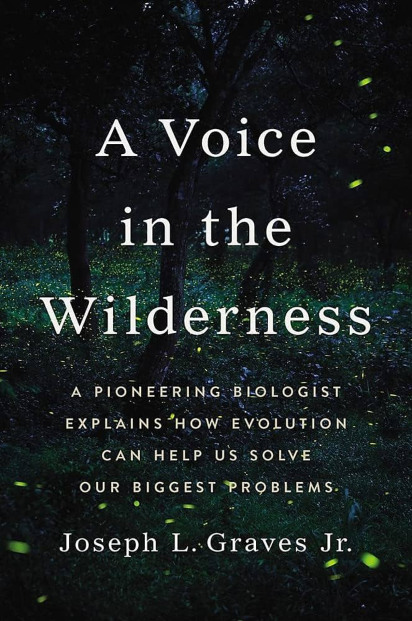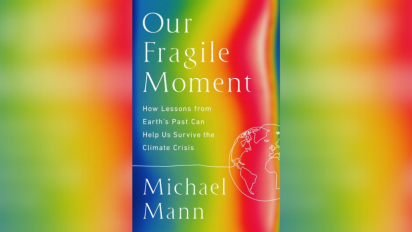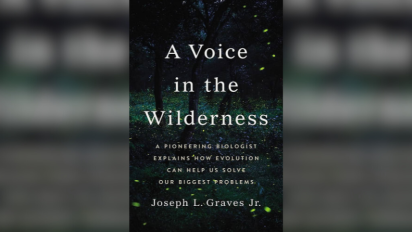[Review] A Voice in the Wilderness: A Pioneering Biologist Explains How Evolution Can Help Us Solve Our Biggest Problems
Written by Joseph L. Graves Jr., a well-known evolutionary geneticist at North Carolina A&T State University and the first African American to receive a PhD in evolutionary biology (in 1988), A Voice in the Wilderness is a mix of reflection, memoir, and scientific explication, as well as an exhortation to appreciate the explanatory power of evolutionary biology and its potential to help solve some of humanity’s biggest problems. Graves takes the reader through a kind of personal journey exploring the way in which his two passions, evolutionary science and social justice, have intersected in his life and work. (Read our Random Samples interview with Graves.

Part I, entitled “Black Darwin,” is devoted to Graves’s family background and education, which was shaped by the challenges facing an African American entering a scientific field with a dominant Eurocentric focus. Graves takes us through his personal struggles as well as his triumphs in science, and in the process introduces us to some of the towering figures in late-twentieth-century ecology and evolutionary biology who inspired him and then enabled him to obtain his PhD at Wayne State University. Graves started his doctoral work at the University of Michigan in a program with a stellar reputation in ecology and evolutionary biology, but was derailed, as it were, by his extensive involvement in social justice movements in the early 1980s that took him away from his studies. That he completed his dissertation at an urban campus in Detroit, a city rich in African American history and in union activism, is not at all accidental, he notes: the mix of politics and science was instrumental to his eventual success.
Part II of the book, entitled “Why Evolution Matters,” takes the reader through Graves’s career as successful evolutionary researcher, educator, program director, and indeed leader in a number of national initiatives to raise awareness of not only the importance of the science of evolutionary biology but also its dangers, especially when misused to disparage entire classes of people. Graves is especially attuned to racialized thinking in evolutionary biology and draws on a wide range of scholarship in anthropology, sociology, and the history of science to expose the fallacies and misunderstandings common in these wrongheaded approaches. He also takes pains to include discussions of class, gender, and sexual orientation. But the ways in which evolution matters aren’t limited to its misuse, and Graves accordingly devotes entire chapters to explaining the importance of evolutionary biology to humanity as it faces contemporary challenges such as pandemics, climate change, and the persistent problem of disparities and inequities in a world where the relationship between social injustice and science has too often been ignored, if not entirely rendered invisible. Having deep familiarity with Biblical scripture, furthermore, a byproduct of his Baptist upbringing, Graves also offers us his reflections on the complicated relationship between science and religion.
In short, A Voice in the Wilderness offers a deeply personal discussion of evolution that guides readers through some of the most dangerous minefields in the history of science, while offering hope for solving some of the most pressing, and indeed existential, problems facing humanity. The book is well-written, and some of the sections are especially compelling, evoking a range of emotions from sadness to anger as Graves recounts his family experiences and his own struggles as an African American scientist encountering structural racism. As a historian of science, I was especially moved by the chapter titled “America’s Biggest Lie,” that featured Louis Agassiz, the notorious Swiss American polygenist, a supporter of separate creation for human races. The inclusion of visual images — daguerreotypes — of seven enslaved people objectified by Agassiz and treated like nonhuman animals is a gut-wrenching example of the misuse of science. I also found especially useful Graves’s recounting of his quasi-debate with political scientist Charles Murray at Williams College in 1994, and his detailed refutations of claims made in Murray’s notorious The Bell Curve: Intelligence and Class Structure (1994) written with Richard J. Herrnstein.
A Voice in the Wilderness is an important book for anyone interested in science education, not only in order to gain greater understanding of the explanatory power of evolutionary biology and its place in modern culture but also to understand the fallacies surrounding the intersection of biology and race.





